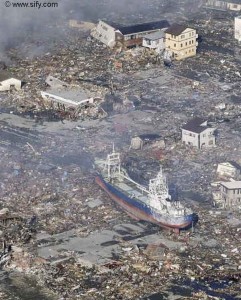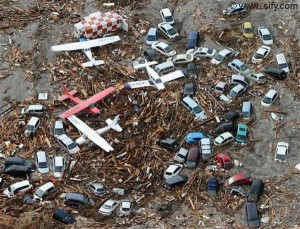On 11 March, Japan was jolted by an earthquake of 8.9 magnitude. Soon a massive tsunami followed. Ten-meter-high waves invaded the eastern coast of the country. The epicentre of the earthquake was so close to the coastline that tsunami waves reached inland almost simultaneously, giving no chance to jolted citizens to flee. Sea waves invaded 10 kms inside and left a grotesque spectre of death and destruction behind. It was the worst tragedy to have hit Japan in last 100 years. Destruction caused by dropping of atom bombs on Hiroshima and Nagasaki towards the end of World War II is being considered as mild in comparison to this one.
We Indians cannot but react with admiration and humility to the calm, fortitude and discipline that the Japanese are displaying in face of this unprecedented devastation.
While the nation was trying to recover from the twin disasters, symptoms of a nuclear malfunction at Fukushima Daiichi nuclear power plant appeared. Desperate attempts by the plant staff to keep the nuclear reactors cool ultimately proved futile and four of its reactors went out of control. The nuclear radiation is not only threatening to reach capital city Tokyo but also across the seas to Korea, China, Russia and even USA. Shut down of nuclear reactors of power plants has reduced Japan’s power production by 50 per cent.
Events since the fateful day, when the tragedy struck Japan events have been cataclysmic. The dead are still to be found and buried; survivors have to be rehabilitated, surface, air and sea communication is to be restored. Fear of a nuclear disaster looms large and wild speculations about Japan’s ability to absorb the body blow are doing round. A herculean rebuilding effort will be needed. With a crippled power generation capacity it is unlikely that industries will reopen soon. Due to radiation risk Japanese exports will have to struggle for their acceptability. Economy despite infusion of large sums by the government in the Nikkei and central bank is showing a downward trend.
 Video footage of the tragedy are heart wrenching. Wide spread destruction, human tragedy, nuclear catastrophe, aftershocks, adverse financial repercussion are staring in the face. One thing that stands out in this grim scenario is the courage of Japanese people. Most of them are evacuees due to impending nuclear disaster. They haven’t had a chance to go back and search for their family members or salvage their belongings from the rubble. Staying in temporary shelters under inclement weather, with bare minimum amenities they have displayed exemplary discipline and maturity. They stand in line outside the nearly empty stores waiting for their turn to buy leftover provisions.
Video footage of the tragedy are heart wrenching. Wide spread destruction, human tragedy, nuclear catastrophe, aftershocks, adverse financial repercussion are staring in the face. One thing that stands out in this grim scenario is the courage of Japanese people. Most of them are evacuees due to impending nuclear disaster. They haven’t had a chance to go back and search for their family members or salvage their belongings from the rubble. Staying in temporary shelters under inclement weather, with bare minimum amenities they have displayed exemplary discipline and maturity. They stand in line outside the nearly empty stores waiting for their turn to buy leftover provisions.
 There is no bitterness towards god or fate or government. Japanese people face journalists with remarkable composure and in measured tone narrate their experience. They are getting used to ‘blackout’ regimen which is being enforced by power companies to save on the meagre resource. They know that it is a long haul ahead. Senior citizens, who have witnessed ravages of World War II are particularly unfazed. Stoic silence on their wizened faces conveys the dictum of survival – this shall also pass.
There is no bitterness towards god or fate or government. Japanese people face journalists with remarkable composure and in measured tone narrate their experience. They are getting used to ‘blackout’ regimen which is being enforced by power companies to save on the meagre resource. They know that it is a long haul ahead. Senior citizens, who have witnessed ravages of World War II are particularly unfazed. Stoic silence on their wizened faces conveys the dictum of survival – this shall also pass.
All has not gone, for the self-respect of the Japanese is still intact.
Some of our fellow Indians, instead of being sensitive to the tragedy in Japan, have been worried about the impact of nuclear radiation in India by way of movement of rain-bearing clouds. We are having heated discussions on the television about the very desirability of nuclear energy. The same tendency was in display when the plot to destroy aircraft by use of liquid bombs was discovered in Britain in 2006. The security agencies in India began to disallow even water bottles during travel by air and Delhi Metro. Unfortunately, our reactions to natural and man-made disasters are not only bereft of analysis but empathy as well.
A country is built by its citizens – no matter how adverse situations are. Post World War II reconstruction was possible due to enterprise of the Japanese people. Japan, from a battered and defeated nation rose to become world’s largest economy. At the time, when her arch rival China has piped Japan from the world economic order and present catastrophe has relegated it at least a decade behind, it will be interesting to watch how Japanese people cope with this challenge and rise again.
| Editor’s Pick |
We Indians cannot but react with admiration and humility to the calm, fortitude and discipline that the Japanese are displaying in face of this unprecedented devastation. There has been no undignified lament on part of the people, no cursing of the government, no politicking, no road rage, no demonstrations, and no riots. People can be seen behaving calmly in public places, making conscious efforts to maintain public order. The mutual concern and solidarity is visible in the orderly manner in which people are going about picking up the threads of life. It is visible in the quiet queues to receive the bare human necessities. It appears that the economically vibrant Japan was a story of some distant past.
All has not gone, for the self-respect of the Japanese is still intact.
The most important lesson for India is that the biggest natural resource of a great nation is the character of its people. India must salute the national character of the people of Japan.
A Chinese has observed: “Faced with the kind of danger, I doubt we would be able to behave so well. How is it the Japanese can do this?”
We Indians have much to learn from the Japanese. A nation cannot be great by temporary solidarity. Nothing is achieved by beating our breast in such trying times. The clamour for doles, compromises our self-respect. And our lack of self-respect gives an opportunity to some people and organizations with vested interests and dubious agendas to exploit natural disasters.
The preparedness to meet such disasters shares analogy with the dictum ‘the more you sweat in peace, the less you bleed in war’. Had it not been for this preparedness Japan would have probably collapsed. Notwithstanding various organizations dealing with disaster management in India, our record in this field has been pathetic.
It is now more than six years, our many tsunami victims are still complaining about not receiving their rehabilitation package. Two years from now I can bet there will be none in Japan.
The most important lesson for India is that the biggest natural resource of a great nation is the character of its people. India must salute the national character of the people of Japan.




